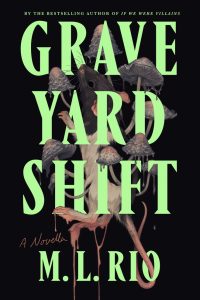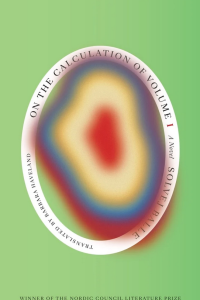Termush by Sven Holm: Review by Gabino Iglesias
 Termush, Sven Holm (Faber Editions 978-0-57137-915-6, £9.99, 119pp, tp) September 2022. (FSG 978-0-37461-358-7, $16.00, 128pp, tp) January 2024. Cover by Rodrigo Corral & Adriana Tonello
Termush, Sven Holm (Faber Editions 978-0-57137-915-6, £9.99, 119pp, tp) September 2022. (FSG 978-0-37461-358-7, $16.00, 128pp, tp) January 2024. Cover by Rodrigo Corral & Adriana Tonello
Sven Holm’s Termush, originally published in 1967, is as timely now as it was back then. A narrative that uses a dystopian lens to look at people and their behavior in the aftermath of an apocalypse, the novel is a short but very sharp study of class differences, the importance of empathy, and the way humans rationalize their actions depending on context.
After a global disaster destroys the world as we know it, a group of wealthy people found refuge in a seaside resort called Termush. The people at Termush could afford the cost of their stay and paid in advance. Within the walls of the resort, they are safe, they are treated well, there’s food and medicine, and they even have access to a doctor. In many ways, the disaster is a reality that’s removed from their daily life. Unfortunately, the outside world, and the people who couldn’t afford to reserve a spot in Termush, still exist, and some of them start showing up at the resort. While they’re not short on supplies, there is the threat of running out at some point, so when the resort starts getting these visitors, and taking in and helping some of them, those who paid for their stay immediately take issue with the refugees. As tensions escalate, the constant threat of everything finally falling apart above and beyond what the resort can protect them from serves as fuel for everyone’s actions, opinions, and deepest fears.
Termush works for many reasons, but the main two are Holm’s understanding of the human psyche and the way he decided to tell this story from the perspective of those inside the resort instead of the people caught outside and dying from what we can assume was some sort of nuclear apocalypse. Holm’s understanding of the human psyche is present in every page of this short novel. Termush was first published more than half a century ago, but the visceral feelings at the core of the people inside Termush could be written in a novel that takes place in 2067 and they would still probably feel perfectly accurate. In a nutshell, what readers get here is a narrative in which the instinct to protect others clashes with the desire to protect ourselves. There aren’t any long passages describing people and their feelings, ideas, idiosyncrasies, and backgrounds here, but we see enough of them to know that, like in most groups, there are good people for whom helping trumps every other instinct and people who are willing to do whatever it takes to keep the outside world outside so as to protect their health, space, food, and medicine.
The second reason this is a necessary read is Holm’s writing: The narrative told from the point of view of a man who could afford to save a spot at the resort forces readers to consider both perspectives. There is something brilliant about books in which good and bad inhabit some grey interstitial space instead of being clearly delineated and occupying diametrically opposed spaces. Yes, we can see the need for help in those that come to Termush, but we also see the fear of those already inside. We see the destruction and pain outside the doors and we feel bad about it, but even if class resentment is always present, we also see how uncertainty and fear can make people very selfish. In a way, Holm forces readers to consider every angle, and in the process, he delivers a timeless narrative that explores the price of safety, the striking differences between the haves and have nots, and how our ideas can be shaken to their core by a really awful event.
Termush is short and powerful. It is a story that does away with every unimportant detail and focuses on exploring how survival works for people who see a major threat from very different angles. This is a provocative novel, but not necessarily because of the way it explores class and privilege; this is a provocative novel because it illuminates how little people have changed in the last half century and how self-interest seems to be ingrained in us, always waiting for the right conditions to reveal itself and show who we truly are at the core.
Gabino Iglesias is a writer, journalist, professor, and book reviewer living in Austin TX. He is the author of Zero Saints and Coyote Songs and the editor of Both Sides. His work has been nominated to the Bram Stoker and Locus Awards and won the Wonderland Book Award for Best Novel in 2019. His short stories have appeared in a plethora of anthologies and his non-fiction has appeared in the New York Times, the Los Angeles Times, and CrimeReads. His work has been published in five languages, optioned for film, and praised by authors as diverse as Roxane Gay, David Joy, Jerry Stahl, and Meg Gardiner. His reviews appear regularly in places like NPR, Publishers Weekly, the San Francisco Chronicle, Criminal Element, Mystery Tribune, Vol. 1 Brooklyn, the Los Angeles Review of Books, and other print and online venues. He’s been a juror for the Shirley Jackson Awards twice and has judged the PANK Big Book Contest, the Splatterpunk Awards, and the Newfound Prose Prize. He teaches creative writing at Southern New Hampshire University’s online MFA program. You can find him on Twitter at @Gabino_Iglesias.
This review and more like it in the September 2024 issue of Locus.
 While you are here, please take a moment to support Locus with a one-time or recurring donation. We rely on reader donations to keep the magazine and site going, and would like to keep the site paywall free, but WE NEED YOUR FINANCIAL SUPPORT to continue quality coverage of the science fiction and fantasy field.
While you are here, please take a moment to support Locus with a one-time or recurring donation. We rely on reader donations to keep the magazine and site going, and would like to keep the site paywall free, but WE NEED YOUR FINANCIAL SUPPORT to continue quality coverage of the science fiction and fantasy field.
©Locus Magazine. Copyrighted material may not be republished without permission of LSFF.









